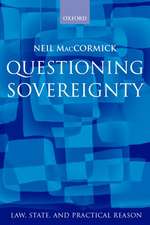Domestic Law Goes Global: Legal Traditions and International Courts
Autor Sara McLaughlin Mitchell, Emilia Justyna Powellen Limba Engleză Hardback – 13 apr 2011
| Toate formatele și edițiile | Preț | Express |
|---|---|---|
| Paperback (1) | 282.49 lei 6-8 săpt. | |
| Cambridge University Press – 4 dec 2013 | 282.49 lei 6-8 săpt. | |
| Hardback (1) | 550.55 lei 6-8 săpt. | |
| Cambridge University Press – 13 apr 2011 | 550.55 lei 6-8 săpt. |
Preț: 550.55 lei
Preț vechi: 618.59 lei
-11% Nou
Puncte Express: 826
Preț estimativ în valută:
105.41€ • 108.13$ • 88.75£
105.41€ • 108.13$ • 88.75£
Carte tipărită la comandă
Livrare economică 26 februarie-12 martie
Preluare comenzi: 021 569.72.76
Specificații
ISBN-13: 9781107004160
ISBN-10: 1107004160
Pagini: 278
Ilustrații: 9 b/w illus. 30 tables
Dimensiuni: 152 x 229 x 17 mm
Greutate: 0.52 kg
Editura: Cambridge University Press
Colecția Cambridge University Press
Locul publicării:New York, United States
ISBN-10: 1107004160
Pagini: 278
Ilustrații: 9 b/w illus. 30 tables
Dimensiuni: 152 x 229 x 17 mm
Greutate: 0.52 kg
Editura: Cambridge University Press
Colecția Cambridge University Press
Locul publicării:New York, United States
Cuprins
1. The creation and expansion of international courts; 2. Major legal traditions of the world; 3. A rational legal design theory of international adjudication; 4. Domestic legal traditions and the creation of the International Criminal Court; 5. Domestic legal traditions and state support for the World Court; 6. The rational design of state commitments to international courts; 7. The consequences of support for international courts; 8. Conclusion.
Recenzii
'This book is one of the few concrete manifestations of the multiple calls to marry social science methods and international relations scholarship with international legal study. Rather than philosophical analysis or normative statements, the authors provide causal arguments and back them up with systematic empirical evidence - a real advance in the field.' Paul F. Diehl, Henning Larsen Professor of Political Science, University of Illinois
'Mitchell and Powell make a major contribution by showing how current international law and international relations reflect the complex interactions of three different legal traditions. Equally important, they generate a sophisticated theory and analysis of the differences between the incentives, opportunities, and behaviors of the states that create international institutions and those that join those institutions after they are created. This work is important reading for scholars of both international law and international relations.' Ronald B. Mitchell, University of Oregon
'This is an exciting and original contribution to understanding ways that domestic politics and institutions influence international relations. Using lay language but rigorous methods, Mitchell and Powell show that states struggle to influence international legal institutions to reflect their own legal traditions. These scholars point out that modelling international courts on domestic legal systems serves to reduce the perceived uncertainty states face when they delegate adjudicative powers to such courts. Theirs is a new and powerful argument, and it will stimulate valuable debate about why it is that states prefer to create and join international institutions in their own image.' Beth A. Simmons, Clarence Dillon Professor of International Affairs, Harvard University
'Mitchell and Powell make a major contribution by showing how current international law and international relations reflect the complex interactions of three different legal traditions. Equally important, they generate a sophisticated theory and analysis of the differences between the incentives, opportunities, and behaviors of the states that create international institutions and those that join those institutions after they are created. This work is important reading for scholars of both international law and international relations.' Ronald B. Mitchell, University of Oregon
'This is an exciting and original contribution to understanding ways that domestic politics and institutions influence international relations. Using lay language but rigorous methods, Mitchell and Powell show that states struggle to influence international legal institutions to reflect their own legal traditions. These scholars point out that modelling international courts on domestic legal systems serves to reduce the perceived uncertainty states face when they delegate adjudicative powers to such courts. Theirs is a new and powerful argument, and it will stimulate valuable debate about why it is that states prefer to create and join international institutions in their own image.' Beth A. Simmons, Clarence Dillon Professor of International Affairs, Harvard University
Notă biografică
Descriere
This book examines how domestic legal traditions influence states' commitments to international courts.


















